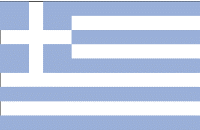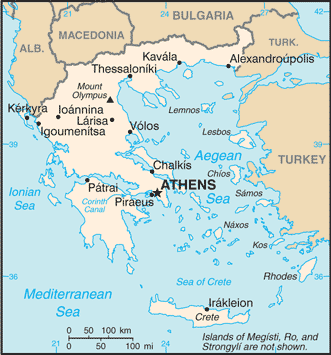Topics Covered
Welcome to Greece
Overview of Resources
Industrial Minerals
Metals
Fossil Fuels
Investment
Sources
Welcome to Greece
Greece with a total population of 10,767,827 as of July 2012, is located in Southern Europe, bordering the Aegean Sea, Ionian Sea, and the Mediterranean Sea, between Albania and Turkey. The country mostly has a temperate climate and covers an area of 131,957 km2.
Greece gained independence from the Ottoman Empire in 1830 and joined the EU in 1981. In 2001, the country became the 12th member of the European Economic and Monetary Union.
 |
The national flag of Greece.
Image Credit: CIA Factbook. |
Greece was hit by the economic recession in 2009 and its economic growth reduced by 2.3% in 2009, 3.5% in 2010, and 6.0% in 2011. The country’s GDP as of 2011 was $298.1 billion.
In an attempt to overcome the recession, the government decided to decrease tax evasion, reform product markets and labor, reduce government expenditure and rework pension and health-care schemes.
Though mining in Greece commenced even before 1000 B.C., the mineral industry has contributed very little to the country’s economy in the past 20 years.
Overview of Resources
The key resources available in Greece include iron ore, lignite, zinc, lead, bauxite, petroleum and magnesite. In 2010, Greece was the world’s fourth largest producer of pumice and a leading producer of perlite. The country also produced about 1% of the world’s bauxite and 9% of the world’s bentonite.
The country’s mineral industry produces and processes metals, mineral fuels and industrial minerals. In 2010, Greece’s mining industry is regulated by the Mining Code that outlines a number of laws and regulations for the exploitation of industrial minerals and ornamental rocks. This code also emphasizes the health and safety factor for various mining and quarrying activities.
Industrial Minerals
In 2010, the Titan Cement company was a chief cement producer in Greece. This company owned four plants whose total cement production amounted to about 6 Mt/yr.
In 2010, Grecian Magnesite S.A. of Greece started to reprocess old stockpiles and also installed a secondary processing line. This secondary processing line provided low-cost raw materials used in the production of caustic calcined magnesia.

The map of Greece. Image Credit: CIA Factbook
Metals
Greece is a key bauxite producer in the EU. Most of the chief bauxite reserves in the country are controlled by S&B Industrial Minerals S.A. The country’s chief bauxite deposits are found in central Greece within the Parnassos-Ghiona geotectonic zone and on Evoia Island. In 2010, the second largest bauxite reserve in Greece was the Delphi-Distomon S.A that produced 800,000 Mt/yr from underground sites.
A feasibility study in 2006 highlighted that Cape Lambert Resources Ltd in Greece can produce about 2,835 kg of gold per year.
Lead, silver and zinc is produced by the Stratoni Mine that started its mining operation in 2005. This mine uses a conventional underground drift-and-fill method to produce a zinc concentrate and a lead-silver concentrate.
In 2010, Larco G.M.M. S.A., was a leading nickel producer in Europe. The company’s Evia and Agios mines produced underground sedimentary-type nickel laterite and smelted the material at the company’s plant in Larymna.
Fossil Fuels
In 2010, about 3,900 Mt of coal reserves were available in Greece that represents almost 0.47% of the world’s total reserves.
In 2010, lignite was commonly used in Greece for generating electricity. Greece was also the sixth largest producer of lignite in the world and the second largest in the EU in the same year.
The production of natural gas in Greece is of less significance as the country has very limited natural gas reserves. The country’s energy requirements are thus met by import from the Middle East, the Caspian Sea area and North Africa as these natural gas producing regions are located close to Greece’s Mediterranean location. In 2010, several petroleum exploration projects were carried out by offshore Greece by Energean Oil & Gas S.A.
Investment
Recent mining reports from Greece highlight the anti-mining protests going on against Vancouver’s Eldorado gold mining. Though officials feel that this mining activity will uplift the country’s economic status, the people of northern Greece are fighting to protect their lands from being destroyed by toxic mining projects. Despite these protests, a number of mineral resource projects will be carried out in the northern part of Greece, including projects for the exploration of mineral fuels offshore Greece.
As far as bauxite is concerned, Greece is likely to remain a chief suppler of bauxite in the global market. The industrial mineral industry will also contribute in uplifting the country’s financial status though in a very minimal way, according to experts.
Besides focusing on the development of mining projects and on the production of bauxite, the government also aims to develop investment programs to reduce operating costs in order to enhance the country’s mineral resource sector.
Experts feel that Greece will see significant improvement in its economic status in the near future with the government’s pro-active plans for the country’s mining and mineral sectors.
Disclaimer: The Author of this article does not imply any investment recommendation and some content is speculative in nature. The Author is not affiliated in any way with any companies mentioned and all statistical information is publically available.
Sources
Disclaimer: The views expressed here are those of the author expressed in their private capacity and do not necessarily represent the views of AZoM.com Limited T/A AZoNetwork the owner and operator of this website. This disclaimer forms part of the Terms and conditions of use of this website.